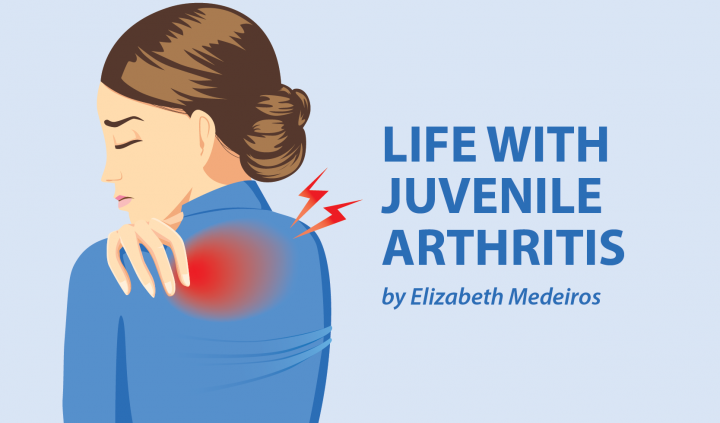Many people have a connection to arthritis. Some of us have grandparents who struggle to garden, or even walk, due to osteoarthritis. Others think of the wear and tear they developed over years of playing sports. Then there are the normal aches and pains associated with aging.
When I was growing up with juvenile arthritis (JA), it was common for people to tell me about their struggles. I heard a lot of: “I have arthritis too, dear,” “I have awful knees now from running track,” and “Some days my back gets sore.” I tried to be polite, but comments like these caused mixed emotions because juvenile arthritis is not the same as arthritis associated with aging.
Osteoarthritis vs. juvenile arthritis
While I sympathize with others’ pain, comments about sore knees felt like they negated the severity of juvenile arthritis. Osteoarthritis, which occurs due to deterioration of the cartilage, can be extremely painful. It is usually treated with physical therapy, steroid shots, anti-inflammatory medications, and even joint replacements.
But juvenile arthritis is not the children’s version of osteoarthritis — kids do not develop it from running or jumping too much. Although there are similarities such as joint pain and deterioration, the diseases are quite different. JA is an autoimmune disease that causes widespread inflammation, typically in the joints, but sometimes in organs such as the eyes. And it’s much harder to treat than people realize. A dose of ibuprofen doesn’t cut it. Many kids rely on powerful medicines to treat JA — and they may struggle with the side effects.
What to say
When you or your child have battled JA, it can be hard to hear people say, “I have a bit of arthritis in my knee, too,” or “You’re too young for arthritis.” While people genuinely don’t mean to be insensitive, it doesn’t make it any less hurtful. I try to keep my cool and respond in one of three ways that seem most appropriate for the situation.
The first is to advocate for JA! Share what you know, and let them know that JA is more than joint pain. Some families like to wear merchandise from organizations such as the Arthritis Foundation to advocate. Personally, I share links to this website and other resources with those who want to learn more. This approach is particularly useful for people who question how a young person could have arthritis.
Another way is to smile and continue the conversation. I’m very receptive to people telling me they also have arthritis — even if it’s not JA. Many people in chronic pain feel comfort and solidarity in meeting others going through similar situations. Even if it’s not the same disease, there are still shared experiences. Over the years, I’ve learned many “arthritis hacks” from grannies and former athletes!
The final way is to drop the subject and end the conversation. While I rarely take this approach, I have used it a handful of times with people who want to play “20 Questions” or “Who Has the Worst Case of Arthritis?” You shouldn’t feel obligated to share private details for the sake of educating someone on JA, nor should you have to compete to see whose is worse.
I wanted people to understand
Juvenile arthritis is not the children’s form of grandma’s arthritis. It’s so much more than pain: It’s a disease that can be grueling on young bodies. Growing up, I wanted people to understand there was a big difference between the two. When I was 14, I took my frustration to the internet and started to write about my struggles with JA for the world to read. I still do this. And though I may not reach the entire world, I think every bit of advocacy we do, from blogging, to sharing resources, to fundraisers, makes a difference.
***
Note: Juvenile Arthritis News is strictly a news and information website about the disease. It does not provide medical advice, diagnosis, or treatment. This content is not intended to be a substitute for professional medical advice, diagnosis, or treatment. Always seek the advice of your physician or other qualified health provider with any questions you may have regarding a medical condition. Never disregard professional medical advice or delay in seeking it because of something you have read on this website. The opinions expressed in this column are not those of Juvenile Arthritis News, or its parent company, BioNews Services, and are intended to spark discussion about issues pertaining to juvenile arthritis.

